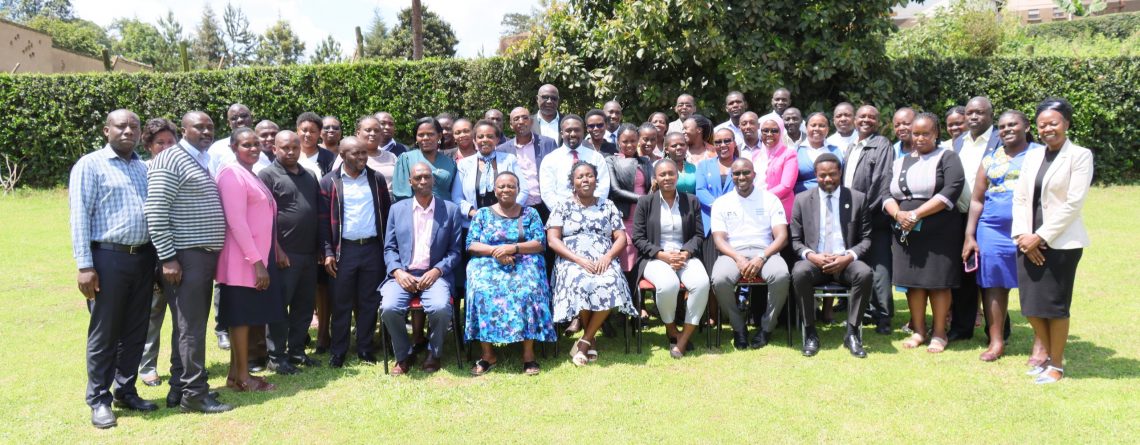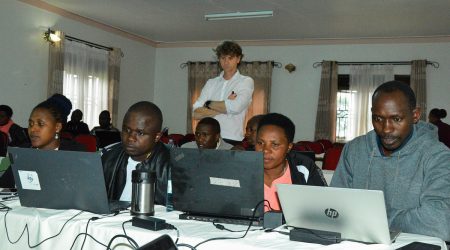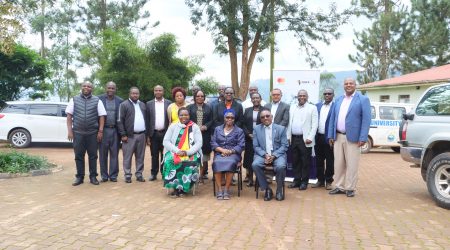Kabale University Enhances Staff Capacity on Amended PPDA Regulations 2023
 Kabale University recently organized a two-day training workshop aimed at equipping staff with knowledge of the amended Public Procurement and Disposal of Public Assets (PPDA) Regulations 2023 and addressing emerging issues in public procurement and disposal. The workshop, spearheaded by the Procurement Unit, brought together cost center managers, deans, associate deans, and cost center administrators to enhance their understanding of the evolving regulatory framework and best procurement practices.
Kabale University recently organized a two-day training workshop aimed at equipping staff with knowledge of the amended Public Procurement and Disposal of Public Assets (PPDA) Regulations 2023 and addressing emerging issues in public procurement and disposal. The workshop, spearheaded by the Procurement Unit, brought together cost center managers, deans, associate deans, and cost center administrators to enhance their understanding of the evolving regulatory framework and best procurement practices.
The training covered various aspects of public procurement, including the roles and responsibilities of key stakeholders, procurement planning and initiation, and reservation schemes designed to promote inclusivity by encouraging the participation of women, youth, and persons with disabilities (PWDs).
The University Secretary, in his opening remarks, welcomed the participants and commended the team from Mbarara for their unwavering support in the university’s procurement processes. He emphasized the integral role of procurement in every department and encouraged staff to embrace the updated regulations to improve efficiency and compliance.
Key Highlights of the Amended PPDA Regulations 2023
A team of experts, including the regional manager and other procurement specialists, outlined significant amendments in the PPDA Regulations 2023, which include:
- Harmonization of Regulations: The new framework consolidates procurement guidelines for both central and local government entities, replacing the previous Local Governments (PPDA) Regulations of 2006.
- Streamlined Administrative Review Process: The appeal process has been simplified, allowing aggrieved bidders to directly approach the PPDA Appeals Tribunal, bypassing the previous step of appealing to the PPDA itself.
- Promotion of Sustainable Procurement: The regulations mandate public procurement and disposal activities to integrate environmental, social, and health safeguards (ESHS) to ensure sustainability.
- Direct Sourcing from Manufacturers: Government agencies can now procure specific equipment directly from manufacturers or their authorized agents to minimize costs and inefficiencies. This applies to aeronautical, medical, agricultural, and industrial equipment.
- Reduction of Procurement Lead Times: The amendments seek to enhance efficiency by expediting procurement processes to ensure timely delivery of goods and services.
- Reservation Schemes: These provisions promote the participation of marginalized groups—youth, women, and PWDs—in public procurement processes. The PPDA has issued operational guidelines to enforce this directive, which became effective on March 22, 2024.
Strengthening Procurement Planning and Budget Execution
 The training also emphasized the adoption of a performance-based budget by the Government of Uganda. Staff were encouraged to ensure timely contract signing and fund allocation before commencing any procurement processes. This approach is intended to prevent financial shortfalls and ensure that government funds are fully utilized without unnecessary delays.
The training also emphasized the adoption of a performance-based budget by the Government of Uganda. Staff were encouraged to ensure timely contract signing and fund allocation before commencing any procurement processes. This approach is intended to prevent financial shortfalls and ensure that government funds are fully utilized without unnecessary delays.
Additionally, institutions were advised to align their procurement plans with approved budgets and ensure clear cost identification from respective user departments. Even where external funding is involved, PPDA regulations remain applicable unless specific procurement guidelines are provided by the funder.
Micro Procurement and Disposal Planning
A key change highlighted during the training was the adjustment of the micro procurement threshold from UGX 2 million to UGX 5 million. However, a minimum of three bids must still be obtained, and the evaluation process must be duly followed. The PPDA Act applies to all public funds, including those allocated for national programs, reinforcing the need for compliance in all financial transactions.
Disposal planning was also underscored as an essential component of procurement planning. The amended regulations introduce Corporate Social Responsibility (CSR) considerations in the disposal of assets, with a focus on benefiting underprivileged communities. Furthermore, procurement specifications should prioritize environmental sustainability, with an environmental expert included in procurement committees to ensure compliance with green procurement standards.
Categories of Public Procurement and Evaluation Procedures
The PPDA regulations support procurement across various sectors, including:
- Supplies: Furniture, seedlings, uniforms, etc.
- Consultancy Services: Auditing, training, capacity building.
- Non-Consultancy Services: Security services, etc.
- Works: Construction, renovation, etc.
 The training reinforced the importance of confidentiality in the evaluation process, which consists of three key stages: preliminary examination, technical/detailed evaluation, and price/financial evaluation. The evaluation committee must ensure transparency and communicate the outcomes of procurement processes to all relevant stakeholders.
The training reinforced the importance of confidentiality in the evaluation process, which consists of three key stages: preliminary examination, technical/detailed evaluation, and price/financial evaluation. The evaluation committee must ensure transparency and communicate the outcomes of procurement processes to all relevant stakeholders.
Conclusion
The workshop concluded with remarks from the University Bursar, who reiterated the importance of adhering to PPDA regulations in all procurement activities. Kabale University remains committed to ensuring that staff are well-equipped with the latest procurement knowledge to uphold transparency, efficiency, and compliance with national guidelines.
Discover more from Kabale University News
Subscribe to get the latest posts sent to your email.













Leave a Reply